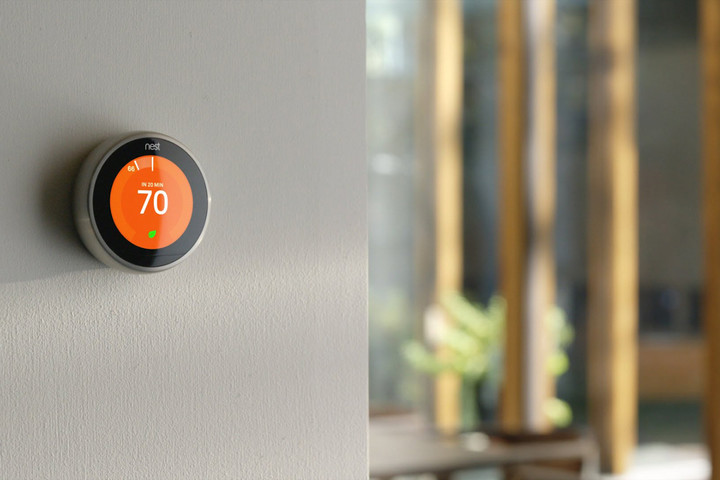
“Choose renovations that fit your area,” we’re often told by real estate agents and designers. In other words, if buyers in your area love marble countertops and real hardwood flooring, choosing those design options are your best bets come resale time. But what about home technology renovations and smart home products? These days, homeowners also have to decide whether to invest in features such as smart appliances, smart thermostats, touchless faucets, and even green features like solar panels and spray foam insulation.
“Just as with any home upgrades, spending money on costly features, materials, etc. does not necessarily boost your home’s value by the same amount,” Jill Simmons, director of consumer communications for real estate site Zillow, told Digital Trends. “Be mindful of neighborhood comps, the style of your home, and its price point. If you’re considering selling, think about which smart home features will appeal to the most buyers possible so you’re not limiting your home’s style to just one type of buyer. The more buyers you can attract to your home the better. Discuss with your local agent or real-estate professional what buyers are looking for in your area, and what features might be suitable in your home,” Simmons adds.
There are a few renovations and smart home products that are considered overall winners, however. The following tech upgrades are typically worth the investment, as they can boost your home’s resale potential.
Smart thermostats and security systems

Inexpensive tech such as smart thermostats and smart home security systems can make your home stand out, and you won’t have to shell out thousands of dollars to make your abode shine.
“Having smart home features like newer security systems, smart thermostats, etc. are great features to tout in listing descriptions and may help attract a buyer’s eye, which can go a long way when it’s time to sell,” explains Simmons. “Additionally, smart home features may signal to buyers that the home is updated, and may have other desirable traits, upgrades, or features.”
Most of the big security providers, including Comcast and ADT, now offer affordable smart home security. You also have the option to purchase a DIY home security system, like SimpliSafe, for around $300. Thermostats like the Honeywell Lyric 5 Thermostat sell for around $115 on Amazon, while others, like the Nest Learning Thermostat, retail for around $250.
Tankless water heaters

Tankless water heaters never run out of water because they heat your water on demand, instead of storing 40 or 50 gallons of hot water. This makes your home run more efficiently, and it can also save you about $80 a year on your electric bill. The one big negative is the upfront cost. A typical tankless water heater can cost anywhere between $500 and $2,000, depending on the model. Installation costs will also run you an additional $1,557 on average, according to Home Advisor.
A recent Zillow home listing analysis found that these products may be worth the initial investment, however. The real estate marketplace searched through listing descriptions from over 2 million U.S. homes sold between January 2014 and March 2016, and then examined how certain keyword features impacted a home’s sale price and speed of sale. They found that homes with tankless water heaters sold for 4 percent more than their expected value. These homes also sold 43 days faster than expected.
Solar panels

Solar panels can save homeowners as much as $2,000 a year on their energy bills. But your savings and your costs depend on your location. As of 2016, the typical cost of solar panels in the United States is between $3 and $4 per watt. This means a 5 kW system costs around $12,500 after discounts like the Federal Solar Investment Tax Credit, according to Energy Sage.
Homeowners can also benefit from solar panels at resale time. According to Zillow research, homes that mention solar panels in their listing description sold for 1.8 percent more than expected, and 41 days faster, says Simmons.
Before you upgrade the technology in your home…
It’s a good idea to try and place yourself in a buyer’s shoes. Homebuyers want to get the most bang for their buck, and they want to make smart investments. If you live in a first-time homebuyer neighborhood, for instance, it’s probably not the best idea to fill your home with technology that you’d find in a $1 million home. On the other hand, if you live in a high-end neighborhood, you may not want to skimp on tech features, as other homes selling in the area may have those features.
“It’s a fair assumption that a cost-conscious first-time buyer will likely want cost-conscious homes features, including smart home features. So sellers should try to stay within the character of the home and neighborhood if considering adding smart home features,” explains Simmons. “In general, smart home technologies may have potential for a better return with high-end homes, but that may also be in part because high-end homes are more likely to have those features in the first place, so homeowners may need to incorporate to match the competition and buyer demands at the price point more so than they would if they were marketing to first-time home buyers,” she adds.
Editors' Recommendations
- Kohler reveals luxurious smart home products that turn your bathroom into a spa
- Here’s how to throw a killer Halloween party with your smart home
- Your Google smart home devices just got a lot less talkative
- How smart water management can protect against damage and save money
- How smart tech can improve your 4th of July BBQ


